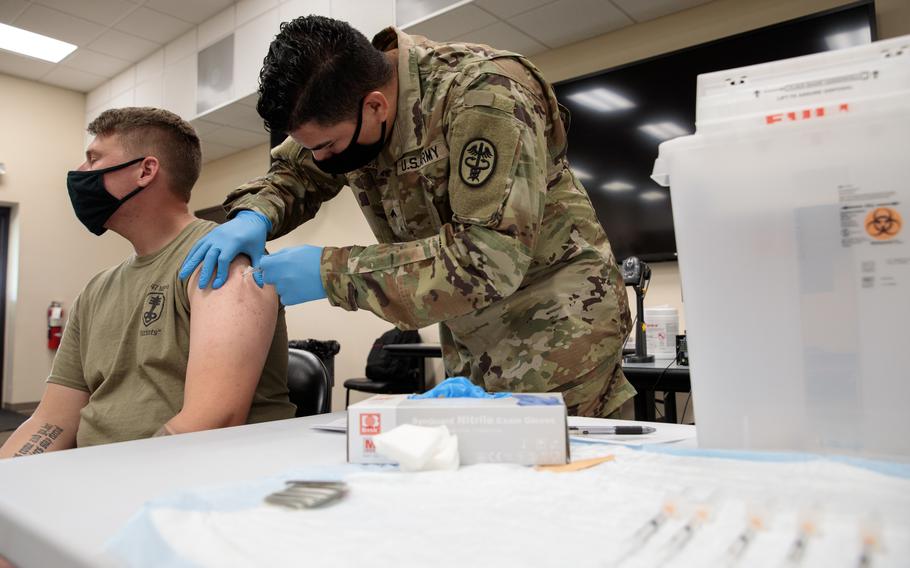
Army Cpl. Jonathan Leon Camacho, a practical nursing specialist with Dwight D. Eisenhower Army Medical Center at Fort Gordon, Ga, injects an Army Reserve soldier from the 447th Military Police Company with the COVID-19 vaccination, Aug 21, 2021, at Camp Shelby Joint Forces Training Center (CSJFTC), Miss. (Brian Barbour/U.S. Army National Guard)
(Tribune News Service) — Army scientists working on a vaccine to target all coronaviruses, including mutations of the one causing COVID-19 and others that may emerge in the future, are finding data from early human trials promising and expect to publish the results by year-end.
Researchers at the Walter Reed Army Institute of Research have been working since the start of the COVID-19 pandemic on a pan-coronavirus vaccine and are currently analyzing data from the Phase I clinical trial, which began in April with dozens of volunteers. They are following up with participants to monitor the safety and effectiveness of the new vaccine one month after each received their last dose.
“Everything that we have been seeing from early stages of design of our vaccine and testing, in all different animal species, has really just been consistent and predictive of a very good response,” Kayvon Modjarrad, director of Walter Reed’s Emerging Infectious Diseases Branch, said in an interview with McClatchy on Tuesday. “Indications are that we are on that same pathway.”
The Walter Reed vaccine — called SpFN — may eventually be used by people who have already received other COVID-19 vaccines “as a bridge towards providing individuals continued, broad, long-term immunity for SARS-like viruses, whether they be variants that emerge in the future or new species of SARS viruses,” Modjarrad said.
The SpFN vaccine deploys a soccer ball-shaped protein that can target the spikes of multiple coronavirus strains on its different faces.
If the results of Phase I trials are positive, the Defense Department, the Biden administration and private industry partners will have to decide on a strategy to proceed with large-scale clinical trials and potential manufacturing, Modjarrad said.
“When you get to the point of larger clinical trials, and larger manufacturing of vaccines, we have to partner with major industry,” he said. “So those are discussions we’re already having in anticipation of the results that we’ll be getting in the next couple of months.”
Modjarrad said that the same laboratories that carried out immune response tests for the vaccines that are currently available in the United States — produced by Pfizer-BioNTech, Moderna and Johnson & Johnson — are the same labs examining SpFN.
“So we’ll be able to directly compare the results of our trial with those of other vaccines,” he said.
Dr. Anthony Fauci, director of the National Institute of Allergy and Infectious Diseases and chief medical advisor to President Joe Biden, told McClatchy earlier this week that the success of a vaccine like SpFN “would be an important advance.”
“If it works and it’s effective, then you can get protection that would be good protection not only against variants of the given SARS-CoV-2, but you’d be protected against any other emergence of a coronavirus of pandemic potential,” Fauci said.
“There’s a lot of important activity going on to develop a pan-coronavirus vaccine as well as a pan-influenza vaccine, and the need for those is clear,” he said. “We’re putting a lot of serious effort into it.”
Modjarrad said that the vaccine could also be of use in the ongoing fight against COVID-19.
“There has been a lot of interest, a lot of momentum that’s been gaining in the investment and advancement of these broad platforms, to get ahead of the next epidemic,” he said. “I want to stress though that as much as I talk about this futuristic approach, we’re not anywhere near done with this pandemic.”
Modjarrad said he fears the emergence of a variant worse than delta, the predominant strain of COVID-19 in the United States.
“One of the nightmare scenarios that sometimes keeps us up at night in the scientific community is, what if you had delta marry and make a baby with beta? Beta’s the South African variant that was really good, probably the best, at escaping immunity elicited by the currently available vaccines,” he said.
“Cases are waning in the U.S. in large part due to large portions of the population becoming vaccinated, but there are still large swathes of the world that remain very undervaccinated and that lack access,” he added.
“Where there are large pockets of unvaccinated people, there is a high probability of variants emerging, and variants will quickly circumnavigate the world as we saw with the alpha variant and, most recently, the delta variant,” he said. “We don’t want to continue that cycle.”
©2021 McClatchy Washington Bureau.
Visit mcclatchydc.com.
Distributed by Tribune Content Agency, LLC.